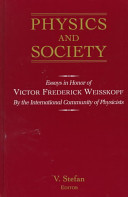The Cultural Importance of Fundamental Research
The value of fundamental research does not lie only in the ideas it produces. There is more to it. It affects the whole intellectual life of a nation by determining its way of thinking and the standards by which actions and intellectual production are judged. If science is highly regarded and if the importance of being concemed with the most up-to-date problems of fundamental research is recognized, then a spiritual climate is created which influences the other activities. An atmosphere of creativity is established which penetrates every cultural frontier. Applied sciences and technology are forced to adjust themselves to the highest intellectual standards which are developed in the basic sciences. This influence works in many ways: some fundamental students go into industry; the techniques which are applied to meet the stringent requirements of fundamental research serve to create new technological methods. The style, the scale, and the level of scientific and technical work are determined in pure research; that is what attracts productive people and what brings scientists to those countries where science is at the highest level. Fundamental research sets the standards of modern scientific thought; it creates the intellectual climate in which our modern civilization flourishes. It pumps the lifeblood of idea and inventiveness not only into the technological laboratories and factories, but into every cultural activity of our time. The case for generous support for pure and fundamental science is as simple as that.
Notes:
Why pure science? in the Bulletin of the Atomic Scientists 1965 21 4-8 Victor Frederick Weisskopf 1908
Folksonomies: science culture research fundamental research
Taxonomies:
/science (0.509887)
/business and industrial (0.389630)
/technology and computing (0.221269)
Keywords:
fundamental research (0.972562 (positive:0.465858)), fundamental research serve (0.831174 (positive:0.597061)), Victor Frederick Weisskopf (0.781553 (positive:0.344266)), highest intellectual standards (0.749355 (neutral:0.000000)), new technological methods (0.746163 (positive:0.597061)), modern civilization flourishes (0.742508 (neutral:0.000000)), modern scientific thought (0.722187 (positive:0.523422)), fundamental students (0.721731 (positive:0.440848)), fundamental science (0.713271 (positive:0.832952)), pure science (0.670016 (positive:0.323249)), Cultural Importance (0.656314 (positive:0.323249)), Atomic Scientists (0.649832 (neutral:0.000000)), pure research (0.644659 (positive:0.331464)), stringent requirements (0.643984 (positive:0.597061)), intellectual life (0.640806 (negative:-0.340132)), intellectual production (0.639854 (negative:-0.340132)), spiritual climate (0.639851 (neutral:0.000000)), up-to-date problems (0.638916 (positive:0.541295)), generous support (0.637688 (positive:0.832952)), cultural frontier (0.635057 (positive:0.685595)), technological laboratories (0.634197 (neutral:0.000000)), productive people (0.632557 (positive:0.685722)), highest level (0.631499 (positive:0.685722)), basic sciences (0.630351 (neutral:0.000000)), technical work (0.628865 (positive:0.331464)), Applied sciences (0.627926 (neutral:0.000000)), cultural activity (0.626743 (neutral:0.000000)), intellectual climate (0.626024 (neutral:0.000000)), lifeblood (0.539807 (neutral:0.000000)), inventiveness (0.538413 (neutral:0.000000))
Entities:
Victor Frederick Weisskopf:Person (0.928882 (positive:0.344266)), Bulletin of the Atomic Scientists:PrintMedia (0.825046 (neutral:0.000000))
Concepts:
Science (0.980998): dbpedia | freebase | opencyc
Scientific method (0.912013): dbpedia | freebase
Research (0.855231): dbpedia | freebase | opencyc
Technology (0.554547): dbpedia | freebase
Applied science (0.547644): dbpedia | freebase
History (0.547045): dbpedia | freebase | opencyc
Empirical (0.531898): dbpedia | freebase
Fundamental science (0.516162): dbpedia | freebase





